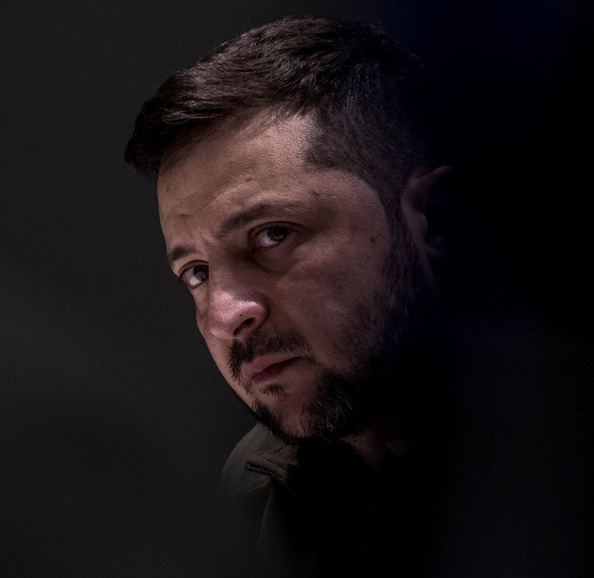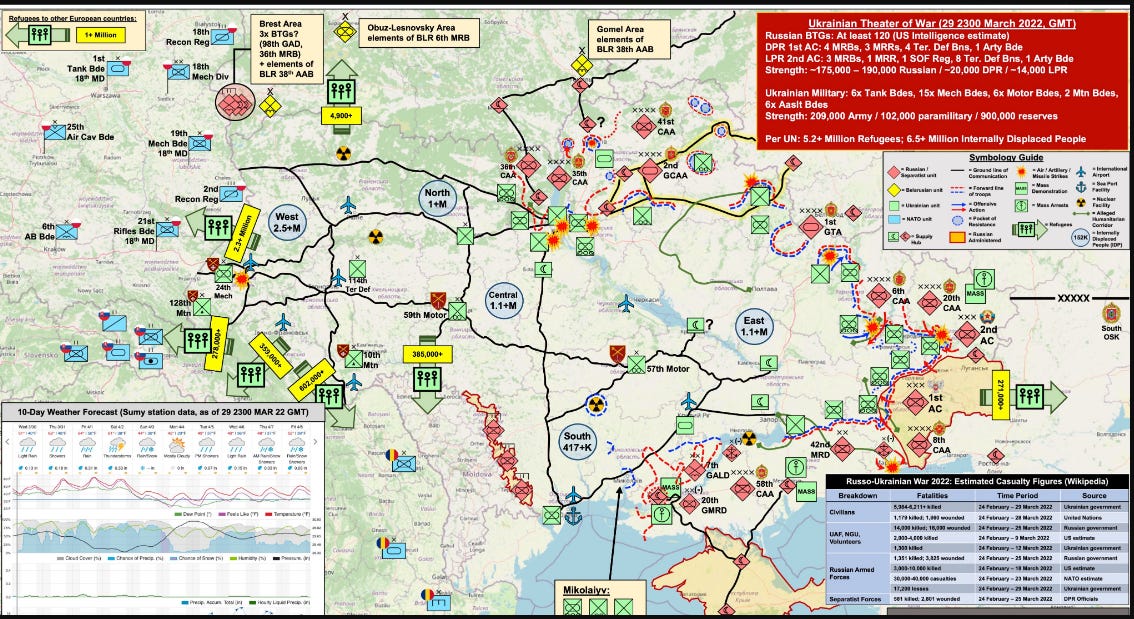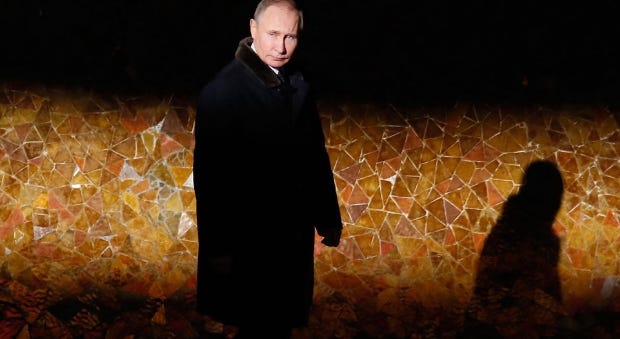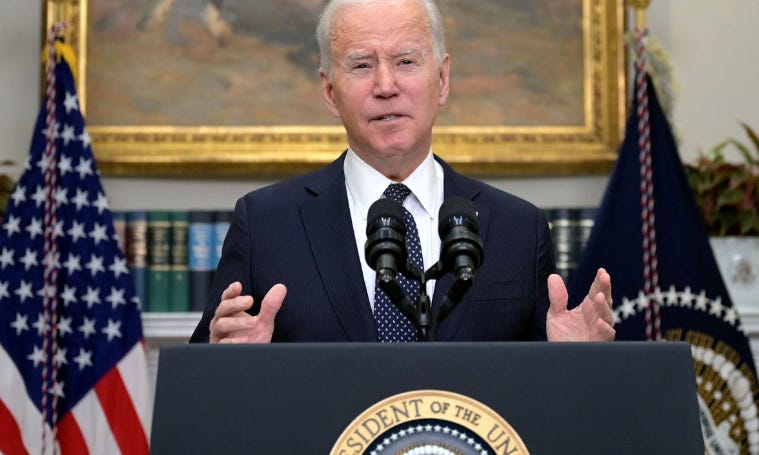The dynamics surrounding Moscow’s war on Ukraine continue to change. Last week, a Russian colonel-general claimed that Moscow’s objective in the war is to seize eastern Ukraine. Yet Russian President Vladimir Putin has not confirmed that this is his sole or even principal objective, and Russian military activity has not pivoted toward the east; Russian rockets continue to menace Kyiv in central Ukraine and more have recently found their way to Lviv in the west. Now not only rocketing (again) rumour Thyroid felt by Putin, but also a lot his ministers and aides very afraid to alarmed him to stop idea a war before Putin himself declared since February 24th 2022, because (afraid) to tell Russian military not really stronger than Putin think. (my live update of war since February 24th in here)
In the meantime, Ukrainian President Volodymyr Zelenskyy has moved in multiple directions as well. In an interview with Russian journalists, he appeared willing to accept Ukraine’s neutrality and agree not to pursue a nuclear weapons program in exchange for ironclad security guarantees over all of Ukraine’s territory. Yet he has also requested more advanced weapons from the West, including conventional ground weapons that he hadn’t asked for in the past.
For his part, US President Joe Biden visited Europe for meetings with NATO, the European Union, and the Group of Seven (G7). While he shored up alliance unity and cooperation with partners, Biden also appeared to suggest publicly that Putin must be removed from office. While the White House quickly clarified that Biden meant that Putin should not be able to coerce outcomes abroad, the Russian media picked this up as endorsement of regime change
Alexei Navalny, the jailed leader of Russia’s opposition, was sentenced to another nine years imprisonment. To serve them he will probably be moved from Vladimir, where he has been kept for more than a year, to a yet harsher maximum-security jail elsewhere.
The crime for which he was sentenced is fraud. His true crime is one of common enterprise with that for which the people of Ukraine are now suffering collective punishment. The Ukrainians want to embrace many, if not all, the values held dear by other European nations. Mr Navalny wants the same for Russia. Vladimir Putin cannot countenance either desire.
Vladimir Putin gave notice of who he was, and what he was capable of, in “First Person”, a transcript of interviews published in 2000, at the start of his overlong rule. In his youth, he recalled, he had been a tough little hoodlum who fought rats in the stairwell of his communal-apartment building and, later, brawled with strangers on the streets of Leningrad. “A dog senses when somebody is afraid of it,” he had learned, “and bites.” He prized loyalty and feared betrayal. He was hypersensitive to slights, to both his country and himself (concepts which, in the decades that followed, became perilously blurred). He bore grudges.
One of them was over the collapse of the Soviet Union. In the interviews he reminisced about a jaunt to Abkhazia and a judo tournament in Moldova: the Soviet empire had been his wealth and pride, and when it fell, he took it hard. “I wanted something different to rise in its place,” he said of the lost Soviet influence in eastern Europe. Frantically burning papers as a kgb officer in Dresden in 1989, grieving the “paralysis of power” that seemed to have afflicted Moscow, he came to associate protesting crowds with disintegration. Corruption, meanwhile, was only to be expected in Russia, he implied—“and if somebody thinks that somebody stole something, let him go and prove it.”
The Russian invasion of Ukraine is a challenge to the entire international order and cannot be allowed to even partially succeed. Rather than pursuing the illusionary relief of a compromise settlement, the democratic world must seek to impose crushing costs on the Kremlin. In practical terms, this means implementing far tougher economic sanctions while providing Ukraine with dramatically upgrading weapons supplies that will enable the country to finish the job of defeating Russia on the battlefield.
Although the war is now in its second month, there still seems to be a lingering lack of recognition in many Western capitals that Ukraine needs to receive far greater quantities of weapons without further delay. It is also time to rethink the types of weapons being delivered to Ukraine. Up until this point, the focus has been on defensive arms and the kind of hand-held weapons necessary to wage an insurgency.
A decisive victory could transform the security of Europe, even wider: from Atlantic until Pacific. However, Ukraine now needs to win a conventional war and requires large-scale deliveries of offensive weapons. First and foremost, this means tanks, artillery, and multiple launch rocket systems.
Ukraine is currently in desperate need of swift political decisions in Western capitals to provide the country with a wide range of offensive weapons. This is the only measure that can realistically stop Putin in Ukraine. It is futile to expect Ukrainian concessions at the negotiating table to satisfy Russia. Such thinking is actually far more likely to encourage Putin, leading to further acts of international aggression in Ukraine and beyond.
Putin has demonstrated in both words and deeds that his principle war aim remains the destruction of Ukrainian sovereignty and Ukrainian national identity. He insists that Ukrainians are in fact Russians and refuses to accept Ukraine’s right to exist independently of Russia. Putin will pursue these criminal goals until he is stopped. Unless the West provides Ukraine with sufficient weapons in the very near future, there may soon be no Ukraine to defend.








